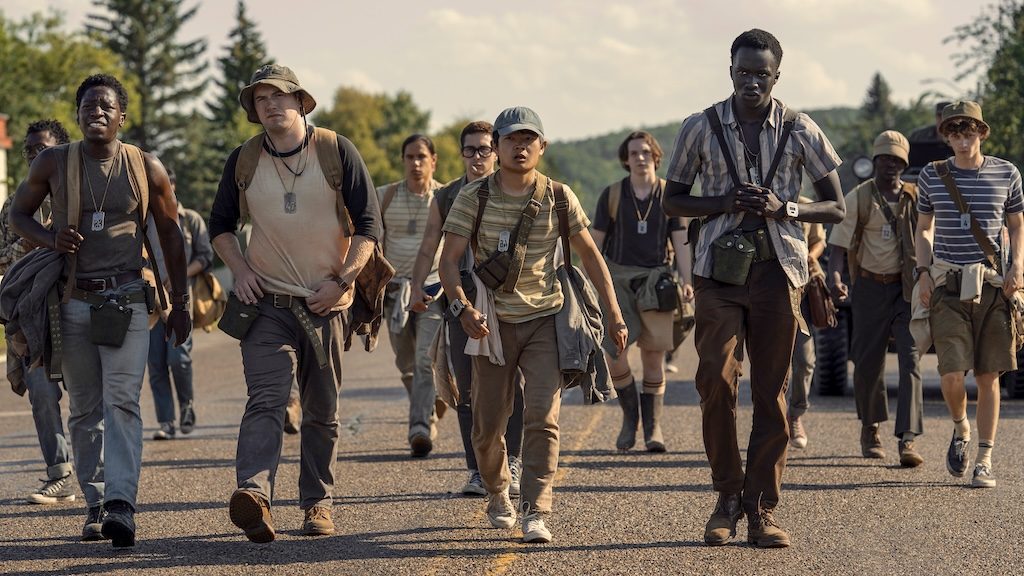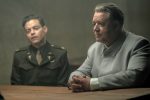JT Mollner Discusses Adapting the Stephen King Classic “The Long Walk”

As a follow up to Strange Darling, visionary indie filmmaker JT Mollner stuck to writing duties for his adaptation of Stephen King’s acclaimed novel The Long Walk which was directed by Francis Lawrence, the director of The Hunger Games franchise films (Catching Fire, Mockingjay – Parts 1 & 2, and The Ballad of Songbirds & Snakes). In this interview with Creative Screenwriting Magazine, JT discusses adapting King’s work and working with Lawrence.
How does adapting a Stephen King novel affect your writing voice?
This adaptation was a fascinating journey for me. I’ve actually done another adaptation for Stephen King since this one, but The Long Walk marked my first step into his world. I felt it was a perfect fit given my long-standing relationship with King’s work. I’ve been reading his novels since I was a kid, and he’s probably the most influential contemporary writer when it comes to shaping my writing style.

JT Mollner
There are various writers who have influenced me throughout my career, but Stephen King stands out, particularly because of how accessible his stories are while containing profound, complex themes. In this adaptation, his voice and intentions felt like a comfortable space for me. While writing the screenplay, I aimed to retain my unique voice, but I also found that our styles were so compatible, especially for a narrative like this, that finding that middle ground came naturally.
I wanted to ensure that I went all the way with the adaptation. King’s original book is unrelenting — it’s powerful. The themes, though the narrative might seem simple on the surface, are rich with metaphors and deeper meanings. This made me really excited to dig into the material.
I wanted to write without constraints, free from worries about things like ratings or whether certain elements would be considered “going too far.” From the outset, I committed to going all the way, and that ethos aligned perfectly with my writing voice, which thrives on boldness and authenticity.
How did you make the story your own?
Honestly, the pressure was mostly self-imposed. I really wanted Stephen King and his fans to appreciate my interpretation of his work. As I’m a lifelong fan of his, I felt an intrinsic responsibility to get it right. I believed I could be loyal to the DNA of the original story rather than just focusing on the narrative framework itself. I thought that by honoring the core elements of King’s storytelling, we could create something special and still accessible to existing and new fans.
Interestingly, much of the pressure as the writer only was alleviated for me because I had just come off a challenging production experience with Strange Darling. While that project was extremely rewarding and exciting, it was quite tumultuous. Managing a film from writing through production can be intense, and I found myself very much involved in every step.
After wrapping up that project, I spoke with Steven Schneider and Roy Lee, two of my producers. I mentioned that I wanted to take a step back and work on something where I could create without being in the spotlight. I wanted to focus fully on writing for a capable director rather than managing every detail myself. I just wanted to go into this movie and be a good soldier.
Roy asked me, “What do you want to do next?” I simply said, “I want to write something for a good director.” He quickly said, “How about The Long Walk?” It was perfect timing. I was emotionally and creatively drained after the previous film and didn’t want to be directly responsible for every department again. I simply wanted to write a good script, turn it in, and let Francis Lawrence take the lead and make it his film.
My thought process was to hand in the script, receive feedback, and then move on to the next project. I wanted to be there to support, but not dominate the creative process.
Having the chance to work with a director of his caliber offers great creative opportunities. I knew he had a deep understanding of King’s work, and I trusted him to bring the essence of the story to life visually.
Francis is an incredible storyteller in his own right, and we shared a partnership from day one. We bounced ideas off each other, and he welcomed my input willingly. I felt my role was to support him with a strong script, allowing him to craft the film into something unique and memorable. I got really zen about the whole thing and it ended up being such a wonderful experience because Francis was open to so many ideas. But he also had great ideas. In the end the buck stops with Francis. It’s his movie.
What are the key themes in The Long Walk?
There’s a number of macro themes about authoritarianism and the most gratuitous version of a capitalistic society.
But none of it matters really as much as the central love story between Ray (Cooper Hoffman) and Pete (David Jonsson). That friendship, camaraderie, and connection is so important. It’s what we decided to focus on completely. We knew all the other stuff would work if we could make sure that we were focused on making this a story of this once-in-a-lifetime connection between these two main characters.
And through this connection, them learning how to put somebody else ahead of themselves, there’s so many things they learn over the course of the walk becoming closer that we wanted to explore.

JT Mollner
Describe your writing process.
When I’m writing an original, I try to outline as little as possible. I know where I’m going to begin the movie. I know where I’m going to end the movie. And I know roughly where the midpoint is. And then I just start writing. I write outlines about each character and who’s going to be in it. And then I just get to work and I find the story in between those beats as I’m writing.
On an adaptation, it’s pretty extensive. I read through the whole book without taking any notes and get an idea of what I’m looking for. And then I read through the book again and I notate, I make notes on every page. I go through page by page and I start writing
I cross out scenes that I’m going to eliminate completely. Sometimes there’ll be five pages gone, and sometimes there’ll be one paragraph gone. Then I’ll start underlining dialogue that I want to keep from the book. I’ll underline dialogue, underline moments that I want to keep. And then I’ll go through it again to see if I’ve missed anything out.
Then I’ll look for which deaths are we going to include and where are they going to happen? Then it looks more like a more traditional outline. After that, I start writing the screenplay while flipping through the book. And then I decide I’m going to skip that. I’m going to get to this. Oh, maybe I should slide that?
My first draft was way too long because I let the characters talk as long as they want to so I can get to know their voices.
Were there specific challenges unique to adapting The Long Walk into a screenplay?
Adaptation is both rewarding and challenging. King’s novels delve deeply into characters’ psychological realms, which is difficult to express in a screenplay. You want to encapsulate rich inner lives while keeping the pacing and visual engagement in mind.
With The Long Walk, I aimed to retain the raw tension and emotional depth of the story. The screenplay had to reflect both the intense physical journey and the psychological tension of the characters. It’s essential for the adaptation to convey that unique blend of external and internal conflicts that make King’s novels resonate.
The hurdles of adapting his work often stem from balancing the grand themes with the need for dramatic economy in film. I was deeply committed to preserving that unfiltered energy in the script, so I consciously focused on capturing the emotional and psychological undercurrents that King is known for.
What steps did you take to ensure that your adaptation honors Stephen King’s storytelling?
I held King’s original intent in the highest regard throughout the adaptation. I devoted ample time to analyzing the source material, identifying the key themes, character arcs, and symbolic elements that make it unique. My goal was to honor the essence of his storytelling while remaining true to my voice.
It was crucial for me to understand not just the plot, but the emotional arcs of each character. I aimed to be a good steward of King’s narrative, working to ensure that the characters still reflected their struggles, hopes, and fears.

Photo courtesy of Lionsgate
How does your past work influence your creative process?
My previous experiences definitely impacted my approach to this screenplay. Having just directed my own film, I learned a ton about the intricacies of production, collaboration, and the inherent challenges that arise while navigating a film set.
That experience taught me the value of accessibility and flexibility in the creative process. As I transitioned into writing this script, I wanted to embody that spirit. I didn’t want to be overly controlling or micromanage; I aimed for a healthy balance between collaboration and artistic integrity.
Ultimately, my background gave me unique insights, allowing me to approach The Long Walk with a fresh perspective while leaning on the relationships I forged during my previous project. It completely shaped my motivations and the creative direction of the adaptation.
Is there a scene in The Long Walk that speaks to you the most?
There’s a conversation on a railroad trestle with Stebbins (Garrett Wareing) and Ray and Pete that I really like because It’s showing everybody gets stripped down emotionally. They know they’re all going to die except for one of them. And even the person who’s not going to die knows that he’s going to be left without his friends. They’re all being very honest with each other and really kind.
What do you hope audiences will take away from your adaptation?
I genuinely hope that audiences identify with the raw emotional currents that underpin the story—resilience, survival, and the human spirit’s struggle against overwhelming odds. The Long Walk delves into much more than dystopian elements; it’s about deep human connections, the fight for survival, and the nuances of moral choices faced by the characters.
I want viewers to experience the tension of both the physical journey and the emotional weight the characters carry. At its core, this adaptation reflects universal themes that resonate with all of us—struggles, sacrifice, pain, but also hope and companionship.
Ultimately, my aspiration is for this adaptation to stand as an independent piece while still embracing the spirit of King’s original work. It’s about honoring the legacy that came before while creating something fresh and impactful for both fans and new audiences.
Join the Discussion!
Related Articles
Browse our Videos for Sale
[woocommerce_products_carousel_all_in_one template="compact.css" all_items="88" show_only="id" products="" ordering="random" categories="115" tags="" show_title="false" show_description="false" allow_shortcodes="false" show_price="false" show_category="false" show_tags="false" show_add_to_cart_button="false" show_more_button="false" show_more_items_button="false" show_featured_image="true" image_source="thumbnail" image_height="100" image_width="100" items_to_show_mobiles="3" items_to_show_tablets="6" items_to_show="6" slide_by="1" margin="0" loop="true" stop_on_hover="true" auto_play="true" auto_play_timeout="1200" auto_play_speed="1600" nav="false" nav_speed="800" dots="false" dots_speed="800" lazy_load="false" mouse_drag="true" mouse_wheel="true" touch_drag="true" easing="linear" auto_height="true"]









You must be logged in to post a comment Login